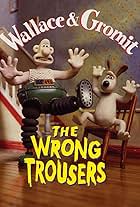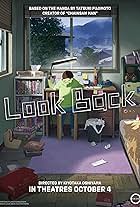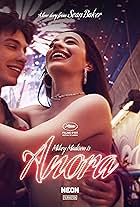Welcome to the new profile
We're still working on updating some profile features. To see the badges, ratings breakdowns, and polls for this profile, please go to the previous version.
Ratings979
rafaelcr44's rating
Reviews34
rafaelcr44's rating
Man, man, man... what a year for Joaquin Phoenix... "Beau is Afraid", despite him doing a great performance, is the most disappointing movie of the year for me, and Napoleon managed to be worse. As I'm not a historian, I won't analyze or criticize any historical inaccuracies here, only the film on its own.
The beginning, where the film fastly tells the audience about the years of horror and the guillotine are genuinely good, the sound job is astonishing, and the battle scenes, from the start to the end, are absolutely epic. But unfortunately my praises about the movie end right now.
Joaquin Phoenix is my favourite actor nowadays, but he's not good as Napoleon. I never saw a great leader on his performance, but a child in a soldier's body. He never passed any sense of grandiosity and leadership that his role requires. And Vanessa Kirby as Empress Josephine is disappointingly uninteresting. Napoleon's second wife (whose name I genuinely forgot) has only one scene and her only functions are marry him and give him his child. The main focus of the film is the romance between Napoleon and Josephine, and it's probably the most boring romance of the year, alongside with Foe.
Ridley Scott's direction here is as childish as Joaquin's performance. The sex scenes are hilarious, this film has the stupid redemption scene I've ever seen in my life, and he seems to treat Napoleon's life like a big theater, like a big circus, where his protagonist is the clown. The cinematography is not bad essentially, but some filter choices would fit a lot better if the director was Wes Anderson. Actually, if the frames were more symmetrical, I could easily say that this was a Napoleon Bonapart satire directed by Wes Anderson, but it's not.
Some people said this film is anti-France, which I strongly disagree, but a movie critic I watch said "probably Ridley Scott used as the base for this story the kids version of the British Encyclopedia articles about Napoleon Bonaparte". And honestly, it's hard to not believe. There are few things as disappointing as watching a 2h40min long biography about someone and feel you learned nothing about the person portrayed. I learned a lot about William Wallace watching Braveheart, I learned a lot about J. Robert Oppenheimer watching Oppenheimer, I even learned about Barbie watching Barbie!
And to finish this review and completely bury this film, were we really in France? I watched Napoleon in a cinema with my uncle, and when we were leaving the session, a man in front of us said "this movie could be in French". He was absolutely correct, this was the most american France I've ever seen. France uses the metric system, nobody adopts a French accent, Napoleon is American and Josephine is British! And it's strange saying this as Ridley Scott 2 years ago directed a masterpiece called The Last Duel, that also takes place in France, but I never felt I was in America. Maybe these feelings in Napoleon happened because Great Britain is a character in the movie as well.
I can't remember when was the last time a movie made me this sad. I think it was when I watched the previously mentioned "Beau is Afraid".
The beginning, where the film fastly tells the audience about the years of horror and the guillotine are genuinely good, the sound job is astonishing, and the battle scenes, from the start to the end, are absolutely epic. But unfortunately my praises about the movie end right now.
Joaquin Phoenix is my favourite actor nowadays, but he's not good as Napoleon. I never saw a great leader on his performance, but a child in a soldier's body. He never passed any sense of grandiosity and leadership that his role requires. And Vanessa Kirby as Empress Josephine is disappointingly uninteresting. Napoleon's second wife (whose name I genuinely forgot) has only one scene and her only functions are marry him and give him his child. The main focus of the film is the romance between Napoleon and Josephine, and it's probably the most boring romance of the year, alongside with Foe.
Ridley Scott's direction here is as childish as Joaquin's performance. The sex scenes are hilarious, this film has the stupid redemption scene I've ever seen in my life, and he seems to treat Napoleon's life like a big theater, like a big circus, where his protagonist is the clown. The cinematography is not bad essentially, but some filter choices would fit a lot better if the director was Wes Anderson. Actually, if the frames were more symmetrical, I could easily say that this was a Napoleon Bonapart satire directed by Wes Anderson, but it's not.
Some people said this film is anti-France, which I strongly disagree, but a movie critic I watch said "probably Ridley Scott used as the base for this story the kids version of the British Encyclopedia articles about Napoleon Bonaparte". And honestly, it's hard to not believe. There are few things as disappointing as watching a 2h40min long biography about someone and feel you learned nothing about the person portrayed. I learned a lot about William Wallace watching Braveheart, I learned a lot about J. Robert Oppenheimer watching Oppenheimer, I even learned about Barbie watching Barbie!
And to finish this review and completely bury this film, were we really in France? I watched Napoleon in a cinema with my uncle, and when we were leaving the session, a man in front of us said "this movie could be in French". He was absolutely correct, this was the most american France I've ever seen. France uses the metric system, nobody adopts a French accent, Napoleon is American and Josephine is British! And it's strange saying this as Ridley Scott 2 years ago directed a masterpiece called The Last Duel, that also takes place in France, but I never felt I was in America. Maybe these feelings in Napoleon happened because Great Britain is a character in the movie as well.
I can't remember when was the last time a movie made me this sad. I think it was when I watched the previously mentioned "Beau is Afraid".
I must admit, I think I'm one of the few Marvel non-fans who didn't attach to the hate chain that "contaminated" the studio after "Avengers: Endgame". I didn't watch all the series but, at least in cinema, I don't think the phase 4 was the tragedy that everyone says it was. But now it's in the past, and Quantumania is the film that opens the phase 5. And I have to agree that it was not the best of the beginnings.
Quantumania should be used as an example of what not to do in the process of world-building. In the first Ant-Man movies, which explored the quantum world superficially, it looked so much more interesting, so much more expandable, so much more alive. But here, besides the terrible visual effects, there's a lack of colour. The film is dark, apathetic, lifeless, and it's possible do make a film that's at the same time dark and vivid, just look at what Jordan Cronenweth did in Blade Runner (and Roger Deakins in the sequel), what Greig Fraser did in Dune and The Batman, and et cetera. And there's a narrative resource that was so dumb that I had no choice but to laugh.
And not only that. With one exception, the new characters are far from being interesting. Katy M. O'Brien's character is a copy-n-paste of Tessa Thompson from Thor: Ragnarok, Bill Murray looks extremely uncomfortable, and Kathryn Newton has nothing to do with Cassie Lang. It's not a problem that she's intelligent, but she almost rebooted her character, she makes no use of anything that Abby Ryder Fortson previously did.
And why this film is called "Ant-Man AND THE WASP: Quantumania"? Evangeline Lilly is even more secondary than she was in the first film (which was only called "Ant-Man"), and so does Michael Douglas. In contrast, Michelle Pfeiffer grows. She is genuinely interesting and it was good to see more of her.
And finally this saga has a good villain. It was not Corey Stoll, who was impossible to take seriously, as he constantly reminded me of Humpty Dumpty. It's Kang the Conqueror, made by Jonathan Majors. He's imposing, he's an excellent actor, and his character has a lot of potential for the future.
I must admit that, despite having plenty of issues, I had a fun time with this film, due to my previous appreciation for these characters, especially Scott Lang (Paul Rudd), but unlike the two other films, I think I'll forget it in one week. And someone who was definitely missed was Michael Peña.
Quantumania should be used as an example of what not to do in the process of world-building. In the first Ant-Man movies, which explored the quantum world superficially, it looked so much more interesting, so much more expandable, so much more alive. But here, besides the terrible visual effects, there's a lack of colour. The film is dark, apathetic, lifeless, and it's possible do make a film that's at the same time dark and vivid, just look at what Jordan Cronenweth did in Blade Runner (and Roger Deakins in the sequel), what Greig Fraser did in Dune and The Batman, and et cetera. And there's a narrative resource that was so dumb that I had no choice but to laugh.
And not only that. With one exception, the new characters are far from being interesting. Katy M. O'Brien's character is a copy-n-paste of Tessa Thompson from Thor: Ragnarok, Bill Murray looks extremely uncomfortable, and Kathryn Newton has nothing to do with Cassie Lang. It's not a problem that she's intelligent, but she almost rebooted her character, she makes no use of anything that Abby Ryder Fortson previously did.
And why this film is called "Ant-Man AND THE WASP: Quantumania"? Evangeline Lilly is even more secondary than she was in the first film (which was only called "Ant-Man"), and so does Michael Douglas. In contrast, Michelle Pfeiffer grows. She is genuinely interesting and it was good to see more of her.
And finally this saga has a good villain. It was not Corey Stoll, who was impossible to take seriously, as he constantly reminded me of Humpty Dumpty. It's Kang the Conqueror, made by Jonathan Majors. He's imposing, he's an excellent actor, and his character has a lot of potential for the future.
I must admit that, despite having plenty of issues, I had a fun time with this film, due to my previous appreciation for these characters, especially Scott Lang (Paul Rudd), but unlike the two other films, I think I'll forget it in one week. And someone who was definitely missed was Michael Peña.
I was raised in a catholic family. I was baptized when I was almost three months old, I did my First Holy Communion when I was 11, but I grew up and paved my own path. Today I consider myself an atheist. My father was a Minister of the God's Word for years, and his "masses" (he wasn't a priest, if he was I wouldn't be even born) were the only ones where I felt something. But this something was not connection to God, it was pride of my dad. He loved doing that and maybe he still loves, and THAT was one of the points that strongly connected me to this film.
There are a lot of religion films that are absolutely restricted to people of that specific religion, and not all of them, but the most practitioners; and when they are aiming on people outside of that religion, it's a movie that usually tries to unnaturally convert its audience. "Southern Gospel" doesn't do that.
From the first scene, it criticizes the structure of the Church and the people who are in it. The movie clearly says "cathechesis is useless" (I wanted to use another word but it would not be appropriate here), it's something that draws you away from God more than it brings you closer. Another crucial thing here is the Holy Bible. The way it's used, interpreted in different manners by different characters, maintains the millenary debate about it open, allows the audience to interprete it freely, and for non-religious people, reinforces that "it's just a book".
In a nutshell, the religion here is, more than anything, the character's background. The story is not about religion, it's about a man trying to achieve his dreams. Max Ehrich (who reminded me of Andrew Garfield all the time) surprised me a lot, he seems to believe in every single word of what he's saying, and these compliments can be extended to J. Alphone Nicholson (who reminded me of Jonathan Majors all the time). The friendship between them seems genuine, and is the heart of this project. The rest of the cast is operant, except for Emma Myers. She is not a bad actress, but number one: Enid Sinclair, her character on "Wednesday", is too fresh in my head and she has the same posturing here; and numer two: Emma was definitely the wrong actress to that role, it was a grosser casting error than Sadie Sink in "The Whale", and what was that wig?
Also, despite the script hitting the bullseye on how it treats the audience on the religious aspect, it fails on telling its story properly, especially on the second half of the second act and the first half of the third act. Two essential informations are not well treated. I'm not talking about disrespect, it's far from the case, but about superficiality. Nicholson and Katelyn Nacon's characters deserved a bit more of attention (20 more minutes would help a lot). But I must be honest, I liked the ending. It's kind of a strange comparison, but it reminded me of "Mrs. Harris Goes to Paris". It almost had the intention of being "inspirational", so it was not surprising that it took this way. And predictable is quite different from bad.
I came from this film skeptical, but even being far from the target audience (yes, even being more accessible, it's still aiming on religious people), the film conquered me, dissolved my cinism and proved that not all religious movies are bad.
There are a lot of religion films that are absolutely restricted to people of that specific religion, and not all of them, but the most practitioners; and when they are aiming on people outside of that religion, it's a movie that usually tries to unnaturally convert its audience. "Southern Gospel" doesn't do that.
From the first scene, it criticizes the structure of the Church and the people who are in it. The movie clearly says "cathechesis is useless" (I wanted to use another word but it would not be appropriate here), it's something that draws you away from God more than it brings you closer. Another crucial thing here is the Holy Bible. The way it's used, interpreted in different manners by different characters, maintains the millenary debate about it open, allows the audience to interprete it freely, and for non-religious people, reinforces that "it's just a book".
In a nutshell, the religion here is, more than anything, the character's background. The story is not about religion, it's about a man trying to achieve his dreams. Max Ehrich (who reminded me of Andrew Garfield all the time) surprised me a lot, he seems to believe in every single word of what he's saying, and these compliments can be extended to J. Alphone Nicholson (who reminded me of Jonathan Majors all the time). The friendship between them seems genuine, and is the heart of this project. The rest of the cast is operant, except for Emma Myers. She is not a bad actress, but number one: Enid Sinclair, her character on "Wednesday", is too fresh in my head and she has the same posturing here; and numer two: Emma was definitely the wrong actress to that role, it was a grosser casting error than Sadie Sink in "The Whale", and what was that wig?
Also, despite the script hitting the bullseye on how it treats the audience on the religious aspect, it fails on telling its story properly, especially on the second half of the second act and the first half of the third act. Two essential informations are not well treated. I'm not talking about disrespect, it's far from the case, but about superficiality. Nicholson and Katelyn Nacon's characters deserved a bit more of attention (20 more minutes would help a lot). But I must be honest, I liked the ending. It's kind of a strange comparison, but it reminded me of "Mrs. Harris Goes to Paris". It almost had the intention of being "inspirational", so it was not surprising that it took this way. And predictable is quite different from bad.
I came from this film skeptical, but even being far from the target audience (yes, even being more accessible, it's still aiming on religious people), the film conquered me, dissolved my cinism and proved that not all religious movies are bad.

























